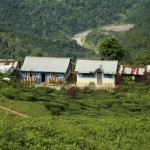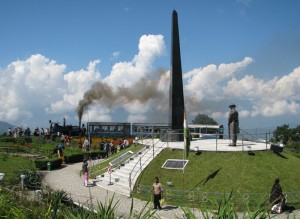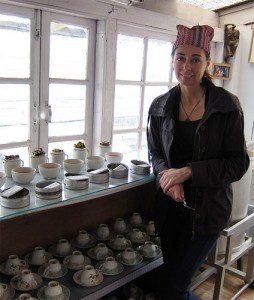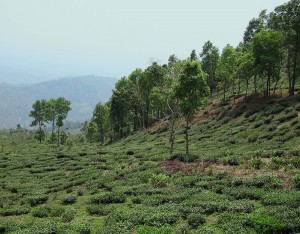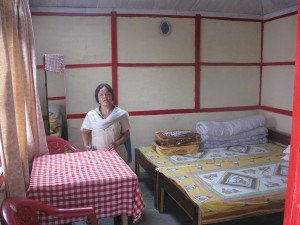Founded in 1859, Makaibari tea estate is one of the oldest and most prestigious tea estates on India. Spreading over 1575 acres of the Himalayan slopes at an altitude of 4600 feet, the garden overlooks River Balasun, a dense forest cover and the picturesque town of Kurseong. Makaibari is still farmed by the original founding family (presently, the 4th generation) in one of the most eco-friendly methods producing organic tea of the highest quality. At Makaibari, you can stay in one of the 16 homestays managed by the villagers and plantation workers and discover the charm of living in a tea estate. You would enjoy traditional hospitality in these Makaibari homestays and savour some of the best home-cooked food. You can enjoy endless cups of Makaibari Tea, participate in tea tasting sessions, try your hands in tea plucking and visit the famous Makaibari tea factory to see the various stages of tea processing from here. You can also go for a trek along the estate, visit a local Hindu temple, do birdwatching or just spend few days doing nothing. BOOKING DETAILS OF MAKAIBARI
Places to see in Makaibari: Tea is everything in Makaibari. Endless slopes of tea gardens spread in all directions is a sight to savour. Sometimes the tea gardens seem to fade into the horizon and sometimes it disappears into the forests.
| [AFG_gallery id=’108′] |
There is an old Hindu temple, a monastery, a bamboo grove and a nameless stream flowing through the jungle surrounding the Tea Estate.
Nearby attractions of Makaibari: Makaibari is just 3 kms from Kurseong town and 33 kms from Darjeeling. All sightseeing destinations of these two towns can be covered from Makaibari in day trips. You can board the famous toytrain of Darjeeling Himalayan Railway from Kurseong, visit local villages perched on scenic destinations like Dilaram, Chimeni and Bagora and trek in the forests around Chatakpur, staying at Makaibari. An early morning visit to the Batasia Loop, Ghoom, Tiger Hill and day trips to the Mountaineering Institute and zoo in Darjeeling should also be on your cards. You can also take a stroll across Darjeeling, do some shopping and spend some nice moments at the Darjeeling Mall watching people.
Things to do in Makaibari: You can take nature walks along the tea gardens and take to the winding paths up and down the slopes skirting the tea bushes. You can try your hands in tea plucking with the some expert plucker or visit the tea factory to see tea processing. You can also take part in tea tasting sessions with tea tasters and start understanding why Darjeeling Tea is considered the world’s best tea. You are sure to return as a “tea pundit” from Makaibari. However, when you are not drinking, plucking or tasting tea at Makaibari, you can enjoy birdwatching, village walks, jungle treks and picnicking beside a meandering stream flowing through the jungle crisscrossed by bamboo bridges.
Nearly, two-thirds of Makaibari Tea Estate is covered by forests which are occasionally visited by leopards. You also stand a good chance of sighting exotic Himalayan birds like the Hornbill, Drongo and the Sultan Tit. You can also spend your afternoons watching the shadows of the clouds over the green stretches of the gardens.
How to reach Makaibari: Makaibari is only 3 kms from Kurseong near Darjeeling. You can get regular Taxis from New Jalpaiguri / Siliguri / Bagdogra Airport to Kurseong and then hire a car to Makaibari Tea Estate. There are regular taxis from Kurseong to Makaibari.
Best time to visit Makaibari: You can visit Makaibari any time of the year. However, if you are a tea lover and want to try your hand in tea plucking then you should visit during March to April for First Flush plucking, April to May for the Second Flush plucking, June to August for Monsoon Flush and October to mid November for Autumn Flush plucking. The tea factory remains open throughout the year but is mostly operational during plucking seasons.
Lodging and dining facilities at Makaibari: There are 16 homestays at Makaibari Tea Estate located in two villages – one is near the tea factory and the other is around 15 mins walk from the tea factory. All the homestays are managed by local villagers and their families who are mostly plantation workers and belong to a local co-operative. All homestays are clean, hygienic and have attached western bathrooms for the guests. Homestays are allocated on a rotation basis to the guests by the co-operative to help every homestay with guests during the season. They all maintain the same standard and offer the same home-cooked organic food.
Photographs by Diane Ryczek and Gourmands

